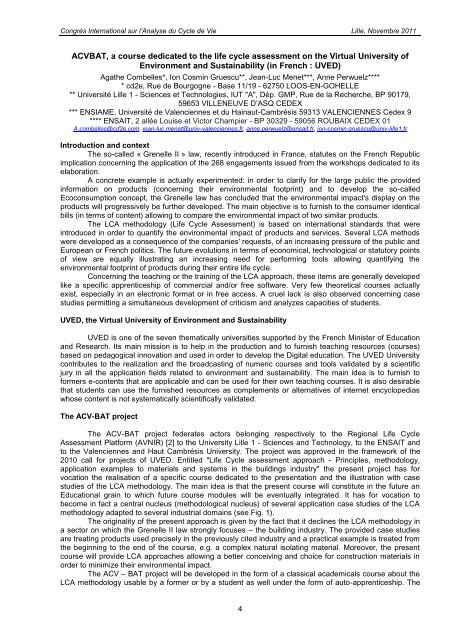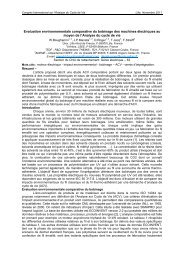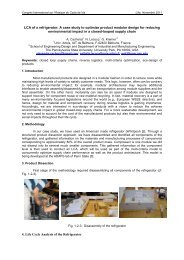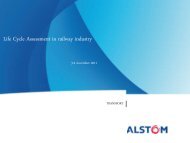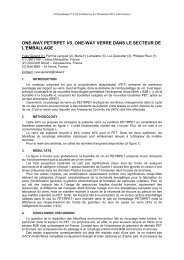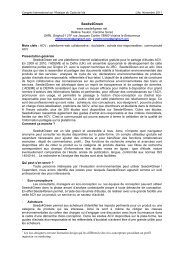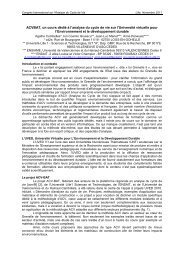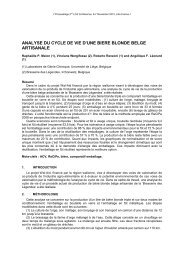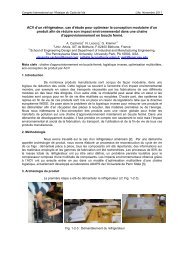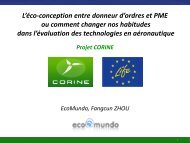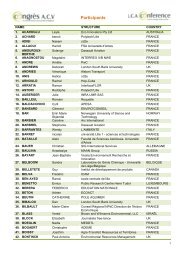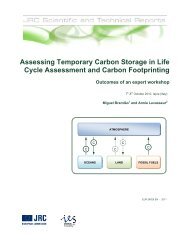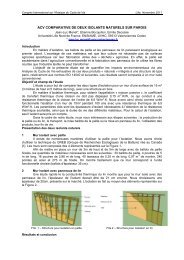Untitled - avniR
Untitled - avniR
Untitled - avniR
You also want an ePaper? Increase the reach of your titles
YUMPU automatically turns print PDFs into web optimized ePapers that Google loves.
Congrès International sur l’Analyse du Cycle de Vie Lille, Novembre 2011<br />
ACVBAT, a course dedicated to the life cycle assessment on the Virtual University of<br />
Environment and Sustainability (in French : UVED)<br />
Agathe Combelles*, Ion Cosmin Gruescu**, Jean-Luc Menet***, Anne Perwuelz****<br />
* cd2e, Rue de Bourgogne - Base 11/19 - 62750 LOOS-EN-GOHELLE<br />
** Université Lille 1 - Sciences et Technologies, IUT "A", Dép. GMP, Rue de la Recherche, BP 90179,<br />
59653 VILLENEUVE D’ASQ CEDEX<br />
*** ENSIAME, Université de Valenciennes et du Hainaut-Cambrésis 59313 VALENCIENNES Cedex 9<br />
**** ENSAIT, 2 allée Louise et Victor Champier - BP 30329 - 59056 ROUBAIX CEDEX 01<br />
A.combelles@cd2e.com, jean-luc.menet@univ-valenciennes.fr, anne.perwuelz@ensait.fr, ion-cosmin.gruescu@univ-lille1.fr<br />
Introduction and context<br />
The so-called « Grenelle II » law, recently introduced in France, statutes on the French Republic<br />
implication concerning the application of the 268 engagements issued from the workshops dedicated to its<br />
elaboration.<br />
A concrete example is actually experimented: in order to clarify for the large public the provided<br />
information on products (concerning their environmental footprint) and to develop the so-called<br />
Ecoconsumption concept, the Grenelle law has concluded that the environmental impact's display on the<br />
products will progressively be further developed. The main objective is to furnish to the consumer identical<br />
bills (in terms of content) allowing to compare the environmental impact of two similar products.<br />
The LCA methodology (Life Cycle Assessment) is based on international standards that were<br />
introduced in order to quantify the environmental impact of products and services. Several LCA methods<br />
were developed as a consequence of the companies' requests, of an increasing pressure of the public and<br />
European or French politics. The future evolutions in terms of economical, technological or statutory points<br />
of view are equally illustrating an increasing need for performing tools allowing quantifying the<br />
environmental footprint of products during their entire life cycle.<br />
Concerning the teaching or the training of the LCA approach, these items are generally developed<br />
like a specific apprenticeship of commercial and/or free software. Very few theoretical courses actually<br />
exist, especially in an electronic format or in free access. A cruel lack is also observed concerning case<br />
studies permitting a simultaneous development of criticism and analyzes capacities of students.<br />
UVED, the Virtual University of Environment and Sustainability<br />
UVED is one of the seven thematically universities supported by the French Minister of Education<br />
and Research. Its main mission is to help in the production and to furnish teaching resources (courses)<br />
based on pedagogical innovation and used in order to develop the Digital education. The UVED University<br />
contributes to the realization and the broadcasting of numeric courses and tools validated by a scientific<br />
jury in all the application fields related to environment and sustainability. The main idea is to furnish to<br />
formers e-contents that are applicable and can be used for their own teaching courses. It is also desirable<br />
that students can use the furnished resources as complements or alternatives of internet encyclopedias<br />
whose content is not systematically scientifically validated.<br />
The ACV-BAT project<br />
The ACV-BAT project federates actors belonging respectively to the Regional Life Cycle<br />
Assessment Platform (AVNIR) [2] to the University Lille 1 - Sciences and Technology, to the ENSAIT and<br />
to the Valenciennes and Haut Cambrésis University. The project was approved in the framework of the<br />
2010 call for projects of UVED. Entitled "Life Cycle assessment approach - Principles, methodology,<br />
application examples to materials and systems in the buildings industry" the present project has for<br />
vocation the realisation of a specific course dedicated to the presentation and the illustration with case<br />
studies of the LCA methodology. The main idea is that the present course will constitute in the future an<br />
Educational grain to which future course modules will be eventually integrated. It has for vocation to<br />
become in fact a central nucleus (methodological nucleus) of several application case studies of the LCA<br />
methodology adapted to several industrial domains (see Fig. 1).<br />
The originality of the present approach is given by the fact that it declines the LCA methodology in<br />
a sector on which the Grenelle II law strongly focuses – the building industry. The provided case studies<br />
are treating products used precisely in the previously cited industry and a practical example is treated from<br />
the beginning to the end of the course, e.g. a complex natural isolating material. Moreover, the present<br />
course will provide LCA approaches allowing a better conceiving and choice for construction materials in<br />
order to minimize their environmental impact.<br />
The ACV – BAT project will be developed in the form of a classical academicals course about the<br />
LCA methodology usable by a former or by a student as well under the form of auto-apprenticeship. The<br />
4


